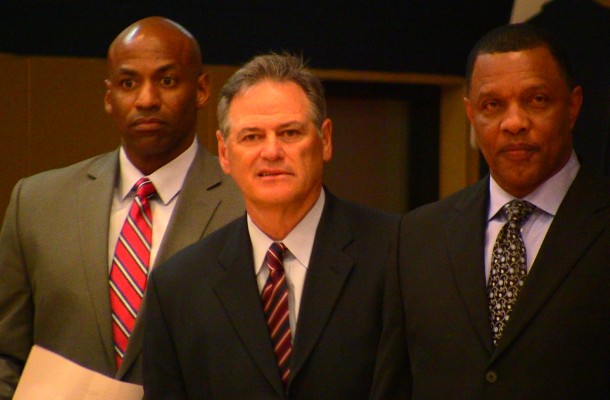In the middle of another NBA post-season missing the New Orleans franchise as a participant, the topic of the week has been the job status of Pelicans head coach Alvin Gentry and, to a lesser extent, GM Dell Demps. Many have expressed discomfort with ownership’s lack of any outwardly stated commitment to the leaders of the team, declaring it another example of their passive, nonchalant operational strategy.
On a personal level – I have been openly critical about the Pelicans’ ownership at times. It often seems as if Tom Benson’s NBA franchise is his third priority, obviously behind the Saints and even less important than his racing horses. However, when it comes to a lack of a public statement by him, Loomis, or Lauscha regarding the fates of Gentry or Demps, I simply don’t think there is anything to be upset about.
While sports franchises are most frequently thought of by fans as entertainment, it is important to remember that they are businesses as well. However, these businesses are unique in nature when it comes to hiring and employment practices. Most companies provide a salary or hourly wage to their employees, but if grounds for termination arise, they are able to (for the most part) cease payment to said employee once he or she leaves the company. In the world of professional sports, both players and management frequently sign multi-year contracts with guaranteed salaries for the duration of those contracts. This key difference has many implications, one of which impacts how executives should lead and manage such an organization.
Unrealistic as it may be, try to imagine the Pelicans’ current structure without guaranteed contracts. Alvin Gentry, Dell Demps, and each of their staffs earn the same annual salary, but ownership can terminate their employment at any time with no financial impact to the business beyond the day that they exit. In such a world, Gentry and Demps would undoubtedly be nervous right now, and the consumers of the on-court product – the fans – would have a right to be frustrated. About a month has passed since the Pelicans’ final game, and ownership has yet to make any sort of declaration about their job status. This type of behavior from ownership would be irresponsible at best, and downright disrespectful to both employees and customers at worst.
Now, flash back to reality. Regardless of what ownership decides regarding the fate of Gentry and Demps, they will both earn next season’s salary. As a result, ownership cannot do much to motivate either of them to succeed beyond their own personal wills to do so. While both certainly have a great deal on the line regarding their respective future careers, there is little at risk in the present (financially speaking). Therefore, what reason would ownership have to give the general manager and head coach – each of whom having done relatively little recently to earn a strong vote of confidence – a feeling of even more job security than a guaranteed contract already provides? Why would it be in their best interest to go out of their way to provide comfort or a sense of strong satisfaction?
Again, Dell Demps and Alvin Gentry are both under contract for next season. Even if a public statement from Tom Benson or Mickey Loomis about their job statuses would appease some fans, doing so would make minimal sense as a business executive. Without a belief that such a declaration would have a real impact on the bottom line, there is just no worthwhile reason to do it.*
*Unless the Pelicans can figure out a way for a statement to simultaneously confirm the status of their head coach and GM while also portraying minimal confidence in said head coach and GM. Two birds, one stone. Well played, Mr. Benson!
